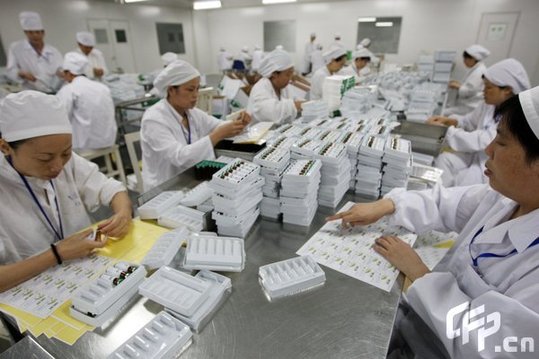To many investors who are reeling under the impact of the global financial crisis, pharmaceutical stocks looked like a safe bet. But after a spurt earlier this year, pharmaceutical shares have lagged the market during the latest rally.
 |
| Pharmaceutical shares lose luster [CFP] |
The benchmark Shanghai Composite Index has gained 3.97 percent, or 96.88 points, from April 7, a day after the government released its 850-billion-yuan healthcare reform plan. It closed at 2536.06 points yesterday, from 2439.18 points on April 7. The Shenzhen Component Index too jumped 5.33 percent from 9232.26 to 9724.58 points.
But, most of the 100-plus drug companies listed on the Shanghai and Shenzhen bourses actually headed down. They include some big brands such as Tonghua Dongbao, Zhejiang Hisun, Huahai Pharmaceutical, Yunnan Baiyao and Tongrentang.
However, analysts said the sector was a promising bet despite the gap between investor expectations and market performance of pharmaceutical companies. "The draft of the healthcare reform blueprint was released last October and its short-term impact on drug companies' shares was amply reflected in the sharp surge late last year and early this year," said Wei Xutao, an analyst at Sinolink Securities.
The pharmaceutical sector had always been seen as recession-proof. And, the sector got a further boost with the reform plan, which was expected to make drugs more widely available under an improved government subsidy scheme.
![Pharmaceutical shares lose luster [CFP] Pharmaceutical shares lose luster [CFP]](http://images.china.cn/attachement/jpg/site1007/20090416/00016c8b5de90b51090361.jpg) |
| Pharmaceutical shares lose luster [CFP] |
But, the final version of the reform guidelines changed little from the earlier draft. It failed to further stimulate investor interest in the sector, Wei said.
From Jan 4 to March 30, the medicine index, a combined index of pharmaceutical firms on the Shenzhen bourse had risen a total of 23.7 percent, from 621.98 points to 769.37 points. During the period, the benchmark Shanghai Composite Index surged 30.34 percent.
"The uncertainty over what medicines (of which company) would be included in the catalogue has caused uncertainties in the minds of investors, leading them to adopt a wait and watch attitude," said Zhang Zhen, analyst, Hong Yuan Securities.
Feng Jiming, a Beijing stock investor, said the medical reform scheme was a good one. "But, I wonder how these general policies would be implemented; that makes it difficult to predict its precise impact on the pharmaceutical sector," he said.
The reform scheme includes a new essential medicines catalogue and a catalogue outlining which basic drugs should first be considered for use. It says essential drugs should be produced and distributed under government control.
The reform plan calls for government to regulate the pricing system of medicines, with particular control on the prices of essential drugs listed in the catalogue. "Some investors worry that the strict supervision could force producers to cut prices, resulting in a profit drop," Zhang added.
Zhang and others agreed that not all pharmaceutical firms would benefit from the reform thrust.
This round of healthcare reform focuses on a centralized purchasing mechanism, which is expected to benefit the large State-owned drug makers, said Zhou Rui, an analyst at China Jianyin Investment Securities.
He also predicted that the large players would seek to rapidly expand their production capacity by acquiring those small and medium-sized producers who are left out of the scheme.
Zhou said that he was particularly bullish about the big traditional Chinese medicine (TCM) companies, because half of the medicines in the new essential medicines catalogue will be TCMs, which are affordable and easily available to a great number of patients in China.
Tongrentang and Yunnan Baiyao were among those companies favored by stock analysts. The latest annual report of the Beijing-based Tongrentang showed that its sales revenue was 2.94 billion yuan in 2008, up 9 percent from 2007, with net profit jumping 10 percent to 260 million yuan. Tongrentang's share price has risen steadily in the past week to close at 16.74 yuan apiece yesterday. Meanwhile, Kunming-based Yunnan Baiyao slid from 36.39 yuan apiece to 35.95 yuan.
"The shares of both the companies are expected to rebound after the basic medicine catalogue is released," said Zhou.
Tongrentang specializes in medicines that treat a wide range of internal problems and Yunnan Baiyao is well known for its trauma treatment drug.
Demand for medicines has been resilient despite economic ups and downs. The pharmaceutical sector is more promising in China than other marketplaces, given the nation's robust economy, said Sinolink's Wei.
Lu Linquan, secretary of the board at Shenzhen-listed Northeast Pharmaceutical said that regulations regarding centralized purchases and optimized distribution chains would help trim costs. So, price control will not affect the profit margin of companies.
Feng bought pharmaceutical shares of companies late last year. "I will hold them, not only because I am confident about their potential but also because I cannot sell them at the current prices," the 50-year-old Beijinger said.
(China Daily April 16, 2009)